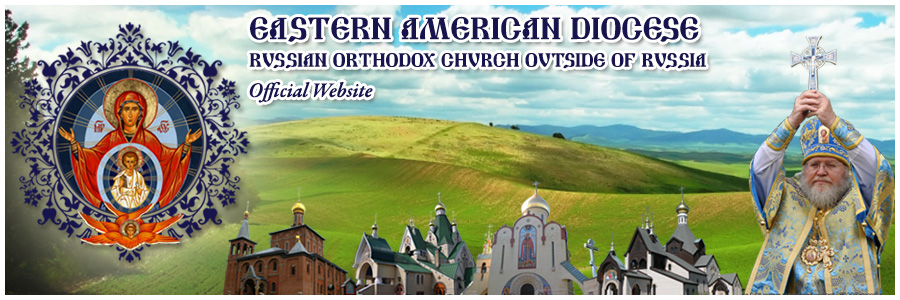
October 31, 2015
Metropolitan Hilarion delivers State of Diocese Address at Diocesan
Assembly
On Tuesday, October 27, the clergy of the Eastern American Diocese
gathered at the Diocesan Center in Howell, NJ for the triennial
General Diocesan Assembly, during which their Ruling Bishop,
Metropolitan Hilarion of Eastern America & New York, called the
Assembly to order and delivered his State of the Diocese address.
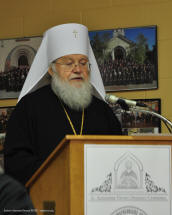 Your
Grace, Reverend Fathers, Brother and Sisters,
Your
Grace, Reverend Fathers, Brother and Sisters,
The founder of our Diocese, Archbishop Vitaly (Maximenko), was a man
of steadfast prayer who believed that the faithful of the Russian
Church Abroad living in America had a great responsibility to
preserve the Holy Church from all defilement and disorder. I appeal
to you through the words that he spoke at the Sixth Diocesan
Assembly in 1948, words that apply to us today, perhaps more than
ever: "In a difficult time, when all are called to account for their
faith, the Lord in His Providence has placed each of us on duty, to
keep guard over the Church. All the more so are faithfulness and
vigilance required of us. In the heart of every one of us, these
cautionary words must sound the warning bell: ‘Watch and pray, that
ye enter not into temptation’" (Matthew 26:41). Every three years,
we gather together as a Diocese not only to elect diocesan officers
and approve a budget, nor merely to offer one another emotional and
moral support. These things are vital, but what takes place here is
more: today we analyze and give an account for what we have been
able to accomplish together as a community in the past three years,
the challenges we have faced and will face, and what we hope to
achieve in the coming three years, with God’s help. It is my
responsibility as your ruling bishop to set the tone and provide a
vision for our stewardship of Christ’s Church, which He has
entrusted to us and for which we must answer at the Dread Judgment.
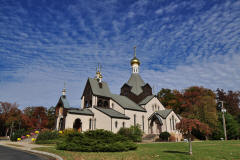 First,
let us examine where we began and how we got where we are today. The
rebirth of an independently administered Eastern American Diocese in
2009 made it possible to once again establish an effective diocesan
administration, separate from the Synodal offices in New York City.
Over the course of the succeeding five years, our staff members have
worked diligently from their homes to create an administrative
structure that would assist the ruling and vicar bishops in
ministering to the needs of the parishes, clergy, and faithful. But
as the Diocese, thankfully, continued to grow, the administrative
workload increased, and it became obvious that the lack of a
physical center with proper offices was impeding the
administration’s efficiency. In 2013, I instructed the Diocesan
Council to work with the administration to find a suitable location
with a church large enough to host joint services and a center
equipped with conference rooms, a banquet hall, and office space.
Several potential locations were discussed, but because of its
central location and expansive facilities, St. Alexander’s was the
logical choice for a Diocesan Center.
First,
let us examine where we began and how we got where we are today. The
rebirth of an independently administered Eastern American Diocese in
2009 made it possible to once again establish an effective diocesan
administration, separate from the Synodal offices in New York City.
Over the course of the succeeding five years, our staff members have
worked diligently from their homes to create an administrative
structure that would assist the ruling and vicar bishops in
ministering to the needs of the parishes, clergy, and faithful. But
as the Diocese, thankfully, continued to grow, the administrative
workload increased, and it became obvious that the lack of a
physical center with proper offices was impeding the
administration’s efficiency. In 2013, I instructed the Diocesan
Council to work with the administration to find a suitable location
with a church large enough to host joint services and a center
equipped with conference rooms, a banquet hall, and office space.
Several potential locations were discussed, but because of its
central location and expansive facilities, St. Alexander’s was the
logical choice for a Diocesan Center.
A transition team was created that worked for several months to
prepare the groundwork for the official opening of the Diocesan
Center, which was held on September 12, 2014. With God’s help and
your support, we have been able to accomplish many wonderful things
since the transition to our Diocesan Center. Staff members no longer
need to work from home, and instead maintain regular office hours in
the same building. This has increased productivity and made it
easier for the administration to manage the day-to-day affairs of
our ever-growing Diocese.
I would like to take this opportunity to personally thank Fr. Serge
Lukianov and all of our administrative staff for their continued
tireless and dedicated service to the Diocese. I am also very
grateful to the pastor emeritus of this cathedral, Fr. Valery
Lukianov, and to all the clergy and parishioners who have opened up
their hearts and made us feel welcome in our new center. Together we
have been able to overcome many of the challenges that were
associated with the transition process.
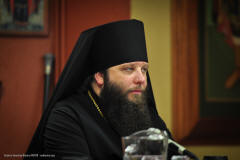 With
the retirement of Bishop Jerome and the transfer of Bishop George to
the Diocese of Australia & New Zealand, a new vicar bishop was
consecrated for the Eastern American Diocese on June 28, 2014.
Bishop Nicholas of Manhattan has been a tremendous help to our
Diocese and to me personally. Despite his duties as deputy secretary
of the Synod of Bishops and caretaker of the Kursk Root Icon,
Vladyka Nikolai
enthusiastically participates in every facet of diocesan life,
making frequent archpastoral visits to parishes and by overseeing
operations at the Diocesan Center, which he visits often. Those who
have had the opportunity to host His Grace in your parishes know of
the love with which he tends to his archpastoral duties. Thank you,
Vladyka, for your love and care of our flock.
With
the retirement of Bishop Jerome and the transfer of Bishop George to
the Diocese of Australia & New Zealand, a new vicar bishop was
consecrated for the Eastern American Diocese on June 28, 2014.
Bishop Nicholas of Manhattan has been a tremendous help to our
Diocese and to me personally. Despite his duties as deputy secretary
of the Synod of Bishops and caretaker of the Kursk Root Icon,
Vladyka Nikolai
enthusiastically participates in every facet of diocesan life,
making frequent archpastoral visits to parishes and by overseeing
operations at the Diocesan Center, which he visits often. Those who
have had the opportunity to host His Grace in your parishes know of
the love with which he tends to his archpastoral duties. Thank you,
Vladyka, for your love and care of our flock.
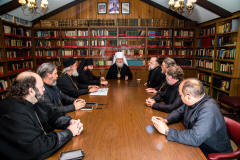 The
past three years have been very productive for the Diocesan Council
you elected. Members of the Council have worked tirelessly for the
betterment of our administration by sharing not only their expertise
and advice, but also by relaying issues of concern to the flock, and
from the flock back to the administration. While there have been
points of contention and disagreement, we were able to overcome them
in a spirit of brotherly love and mutual concern for the Diocese.
Over the past three years, the Council has been able to move past
dealing with purely administrative issues to more serious concerns
facing the Church. We saw this type of collaborative work in the
publication of a statement in response to the legalization of
same-sex marriage in the United States. Council members spent
several days diligently preparing a proper response to the seismic
shift in the political and moral landscape of our country,
emphasizing again that, while the teachings of the Holy Orthodox
Church are timeless and immutable, we must never forget they are
grounded in love for mankind and hope for his salvation. I would
like to thank the Council for its sincerity and labors, which have
greatly assisted me in my archpastoral work.
The
past three years have been very productive for the Diocesan Council
you elected. Members of the Council have worked tirelessly for the
betterment of our administration by sharing not only their expertise
and advice, but also by relaying issues of concern to the flock, and
from the flock back to the administration. While there have been
points of contention and disagreement, we were able to overcome them
in a spirit of brotherly love and mutual concern for the Diocese.
Over the past three years, the Council has been able to move past
dealing with purely administrative issues to more serious concerns
facing the Church. We saw this type of collaborative work in the
publication of a statement in response to the legalization of
same-sex marriage in the United States. Council members spent
several days diligently preparing a proper response to the seismic
shift in the political and moral landscape of our country,
emphasizing again that, while the teachings of the Holy Orthodox
Church are timeless and immutable, we must never forget they are
grounded in love for mankind and hope for his salvation. I would
like to thank the Council for its sincerity and labors, which have
greatly assisted me in my archpastoral work.
With the Diocese growing, it became necessary to rethink our
deaneries system, which was not meeting the administrative,
spiritual, and missionary needs of the parishes. The Deanery of the
South in particular was too large geographically, which made it
difficult for the clergy and faithful to gather and exchange ideas.
The Deanery of the South was reorganized into the Capital Regions
Deanery (encompassing Maryland, Washington, DC, Virginia, and West
Virginia), the Carolinas & Tennessee Deanery, and the Deanery of
Georgia, Alabama & Mississippi. With the ill health and retirement
of Fr. George Larin, the New England Deanery was made given a dean
separate from the parishes in New York State. By creating these
smaller deaneries, the parishes now have better access to their
deans, and can focus on dealing with various challenges that are
common to a particular deanery’s geographical and cultural region.
We wish all of the new deans, as well as those who have served in
their capacities for many years, God’s speedy aid in their ongoing
labors to grow the Church entrusted to us.
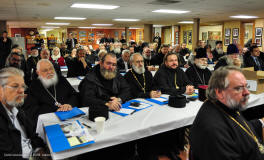 No
administration, of course, can function without financial support.
The administration of a Diocese of this size requires a full-time
staff of several people, a requirement increased by the needs of
day-to-day operation of a diocesan center. They cannot do their work
– and the bishops, in turn, cannot do ours – if they are constantly
chasing after money. Indeed, it is not their responsibility to
entice or coerce the parishes, but rather, it is each parish’s
responsibility to be diligent in paying the 10% required by our
Synod of Bishops. Some parishes, especially the missions in Haiti
and elsewhere, have a dire need, and literally survive on donations
from the rest of the Church. But within the United States, every
parish must do its part to support the Church. If 10% is too much
for a mission church to afford, smaller amounts can be paid, every
effort must be made to support the Diocese and our Synod. Every
parish is likewise required to submit a financial form with a
budget, and do so in a straightforward and timely matter. It should
go without saying that this is the Church, and we never have
anything to hide. If a parish truly cannot make a contribution, a
forbearance must be acquired from the Diocesan Council. Forbearances
are granted, because keeping the parishes open and healthy must be
our first priority, but we cannot forget that everything must be
done with a blessing.
No
administration, of course, can function without financial support.
The administration of a Diocese of this size requires a full-time
staff of several people, a requirement increased by the needs of
day-to-day operation of a diocesan center. They cannot do their work
– and the bishops, in turn, cannot do ours – if they are constantly
chasing after money. Indeed, it is not their responsibility to
entice or coerce the parishes, but rather, it is each parish’s
responsibility to be diligent in paying the 10% required by our
Synod of Bishops. Some parishes, especially the missions in Haiti
and elsewhere, have a dire need, and literally survive on donations
from the rest of the Church. But within the United States, every
parish must do its part to support the Church. If 10% is too much
for a mission church to afford, smaller amounts can be paid, every
effort must be made to support the Diocese and our Synod. Every
parish is likewise required to submit a financial form with a
budget, and do so in a straightforward and timely matter. It should
go without saying that this is the Church, and we never have
anything to hide. If a parish truly cannot make a contribution, a
forbearance must be acquired from the Diocesan Council. Forbearances
are granted, because keeping the parishes open and healthy must be
our first priority, but we cannot forget that everything must be
done with a blessing.
Our treasury is in capable hands. As of August 2014, Reader Gregory
Levitsky has been fulfilling the duties of treasurer entrusted to
him, and has made progress in the Diocese’s finances. He will
address some of the major changes, as well as our overall financial
policy, in his report this afternoon.
Of course, finances are not an end unto themselves; in this fallen
world, even the most basic funding is indispensable for us as we
pursue our work in Christ’s Vineyard. But what underpins that work,
what makes it worthy in God’s eyes, is love. And it is about that
work – and that love – that I will speak to you now.
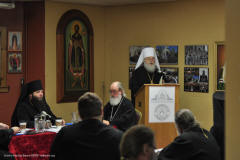 We
have assembled here because we love the Holy Church. We love our
diocese and care about its future. Let us consider deeply what would
happen if we all, together and from this very moment, made a
commitment to increase the love that we have for those around us –
our family, friends, parishioners, and most especially our enemies.
If we strive to multiply the love that we already have for the
Church and our flock, then the Lord, seeing our modest efforts, will
mercifully bestow upon us His grace, which "fulfills that which is
lacking."
We
have assembled here because we love the Holy Church. We love our
diocese and care about its future. Let us consider deeply what would
happen if we all, together and from this very moment, made a
commitment to increase the love that we have for those around us –
our family, friends, parishioners, and most especially our enemies.
If we strive to multiply the love that we already have for the
Church and our flock, then the Lord, seeing our modest efforts, will
mercifully bestow upon us His grace, which "fulfills that which is
lacking."
Without true love in our hearts, we cannot become missionaries of
our Christian Faith. What does it mean to be missionary? Does it
mean that we are to stand on the street corner and shout the "good
news" to those around? No. True missionary work begins when each one
of us strives to become a better Orthodox Christian. It is that
simple. If we can leave this Assembly with a renewed commitment to
acquire the Spirit of peace and love within ourselves, then we will
become better missionaries. If we try to co-suffer and love a little
more each day, then our parishes – an, by extension, our diocese –
will become more spiritually fortified and will naturally grow. But
without love, we will not be able to accomplish anything, regardless
of how hard we try.
St. John of San Francisco tells us that "God saves His fallen
creature by His own love for him, but man’s love for his Creator is
also necessary; without it he cannot be saved. Striving toward God
and cleaving unto the Lord by its humble love, the human soul
obtains power to cleanse itself from sin and to strengthen itself
for the struggle to complete victory over sin." As members of the
Holy Orthodox Church, we must constantly be engaged in spiritual
warfare, so that we may indeed triumph over evil. The world around
us is descending ever deeper into immorality, and our parishes,
these beautiful islands of salvation, are the primary targets of the
enemy of man.
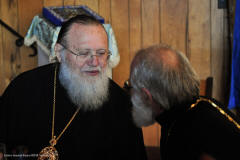 One
of the greatest characteristics of the Russian Church Abroad is the
sense of family that is felt in our parishes. While it is necessary
for us to address various administrative questions and touch on the
various benefits provided by – and challenges facing – the new
Diocesan Center, this Assembly must primarily address the need for
developing and growing our parish communities. This Center, the
Diocesan Council, and administration are not the Diocese –
you are the Diocese.
Every parish, large and small, is a diocesan center unto itself,
because we are all members of One Body, and because you represent
Christ’s Church to the world around your parish. Even with the most
efficiently run administration and the most beautiful center open
daily to serve the needs of the clergy, faithful, and pilgrims, it
will matter little, if our parish communities are not growing
spiritually.
One
of the greatest characteristics of the Russian Church Abroad is the
sense of family that is felt in our parishes. While it is necessary
for us to address various administrative questions and touch on the
various benefits provided by – and challenges facing – the new
Diocesan Center, this Assembly must primarily address the need for
developing and growing our parish communities. This Center, the
Diocesan Council, and administration are not the Diocese –
you are the Diocese.
Every parish, large and small, is a diocesan center unto itself,
because we are all members of One Body, and because you represent
Christ’s Church to the world around your parish. Even with the most
efficiently run administration and the most beautiful center open
daily to serve the needs of the clergy, faithful, and pilgrims, it
will matter little, if our parish communities are not growing
spiritually.
In order for the Diocese to grow, we must cultivate that sense of
family within each parish community for which the Russian Church
Abroad is known, and that sets her apart. As Orthodox Christians, we
understand that no family can survive without the Church, at the
head of which stands Christ Himself. Archbishop Nikon (Rklitsky)
very beautifully describes the role of the Church in the life of
every Orthodox Christian when he says, "The Holy Church is the true
Teacher of life – She teaches Her children how rightly to live and
how rightly to die. In this grace-filled School of life, the Teacher
is Christ Himself, Who invisibly abides in His Church… Our souls,
captivated by sins, constantly whirling about in this world that
lies in sin, are in need of means of healing, and these means are
given to us here in the Holy Mysteries, in prayers, in the
recollections and descriptions of the sacred events of our
salvation, in communion with the spirit of God’s holy saints, in the
keeping of God’s commandments, which defend our soul and body from
the world’s evil."
The call to be more available for the faithful is a challenge in any
parish, but it is easy to understand why those in very small and
far-flung parishes can fall into despair and lose hope. Yet the
smaller and humbler a parish is, the more it can relate to – and
draw inspiration from – the Early Church, when Christians, under
threat of persecution, would gather in one another’s homes and would
give wholly of themselves for one another. It was not for bread that
the first generations of Christians came to the Church, but because
they felt this selfless love, this calling to become something
greater and to live for more. Before the persecutions, they felt the
emptiness of the material world with its brutal entertainment and
pagan idols, and yearned for the Heavenly, for the glory of the
uncreated, for the promise of eternal life. We are no different, and
our position is more like that of the early Christians than it has
been in many centuries. There is nothing new under the sun, and
there is no need for us to invent new methods of achieving salvation
than those offered to us by the example of the Early Church, which
became the very life of its members.
I have heard many stories of priests, deacons, matushkas, and simple
parishioners giving all that they have – often at the expense of
their physical wellbeing ¬– just to help their parishes survive. But
if we are to grow, we must move past mere survival. And we can only
do this through love and mutual support – not only within our
parishes, but within the deaneries and the Diocese, between brother
clerics, between matushkas, between minor clerics, between wardens
and treasurers. Next year, in addition to clergy and choir
conferences, I want us to organize retreats or conferences for altar
servers, sisterhoods, deans, and more. As ever before, our strength
is in our unity.
I would like to share a few examples of missionary work that is
already being done in some of our parishes. Every effort begins
small. Christ the Savior Church in Wayne, West Virginia has been
operating a food pantry for since the beginning of this year. Open
one day a week, the parish is able to feed an average of 150 people.
At St. John the Baptist Cathedral in Mayfield, Pennsylvania, Fr.
John Sorochka has been leading his parishioners in baking bread and
pierogy for over 40 years, both as a fundraiser and a means of
missionary outreach. St. Luke the Blessed Surgeon Church in Coconut
Creek, Florida is open every day to minister to the needs the
Paideia Orthodox Academy, which provides a classical education for
children in an Orthodox setting. Fr. Gregoire and Matushka Rose
Legouté have been successfully operating a school for handicapped
children in Haiti, despite all of the economic hardships that they
face. Other parishes reach out to the local community through
festivals, open houses, and barbeques. Today, you can walk the
streets of Brooklyn and visit our four churches, all of which are
open for the faithful every single day.
While every parish has its own unique set of challenges, there are
many lessons that we can learn from each other, and blessings and
God-given talents that we can offer to one another. This is why we
must try to gather more frequently on a local level, so that we may
continue to learn and grow, and to attract people to the Church.
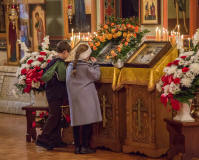 If
we love our Holy Church and wish to see it prosper and grow, then we
must reaffirm our commitment to our youth. We are very fortunate and
blessed to have so many wonderful various youth organizations in our
Diocese – the Synodal Youth Department and St. Vladimir Youth
Association, the Diocesan Youth Choir, St. Herman Youth Conference,
scout organizations like St. George’s Pathfinders and the
Association of Russian Explorers, St. Seraphim’s Camp, and the
Orthodox Summer Camp at Glorious Ascension Monastery.
If
we love our Holy Church and wish to see it prosper and grow, then we
must reaffirm our commitment to our youth. We are very fortunate and
blessed to have so many wonderful various youth organizations in our
Diocese – the Synodal Youth Department and St. Vladimir Youth
Association, the Diocesan Youth Choir, St. Herman Youth Conference,
scout organizations like St. George’s Pathfinders and the
Association of Russian Explorers, St. Seraphim’s Camp, and the
Orthodox Summer Camp at Glorious Ascension Monastery.
Despite all of these wonderful undertakings, there is much more that
we can and should be doing with the youth on a parish level. It is
essential that our parishes become a second home for the youth. This
means that the parish must offer them something outside of the
services so that they have a reason to gather and socialize under
the auspices of the church. If possible, try to designate a room or
a small corner in the parish hall that is strictly for the youth.
Organizing pilgrimages, summer camps, social outings, field trips,
and youth conferences are just a few ways that we can better engage
our younger generations on a parish level.
By sharing our experiences in a spirit of brotherly love and
support, and constantly trying to better ourselves, we can teach our
children how to be better missionaries and ensure a brighter future
for the Diocese. It does not take much to have an impact on a
child’s life: once a child feels warmth and love from the parish
community, they will undoubtedly try to share that love and will
gravitate to the warmth that they feel. Sometimes, all it takes is a
small gesture to make our youth feel loved and appreciated.
Finally, a word about our holy monasteries: glory to God, our
monastic communities are flourishing. They continue to attract
Christians to the monastic calling, to lives of prayer for the
salvation of the whole world. Holy Trinity and Holy Cross
Monasteries especially are constantly undertaking new projects and
obediences, and inspire us by their piety, optimism, and labors for
the glory of God.
Dear fathers, brothers, and sisters, it is a wonderful blessing to
be with you on this journey. I would like to thank you all for the
sacrifices you have made and will make for our beloved diocese.
Prayer must be at the center of all things, but especially in our
work here as a diocese and moving forward. Please remember this
diocese and each other in your prayers. And I would humbly ask that
you would pray for me that I may continue to serve you and our Lord
faithfully for years to come.
Media Office of the Eastern
American Diocese

